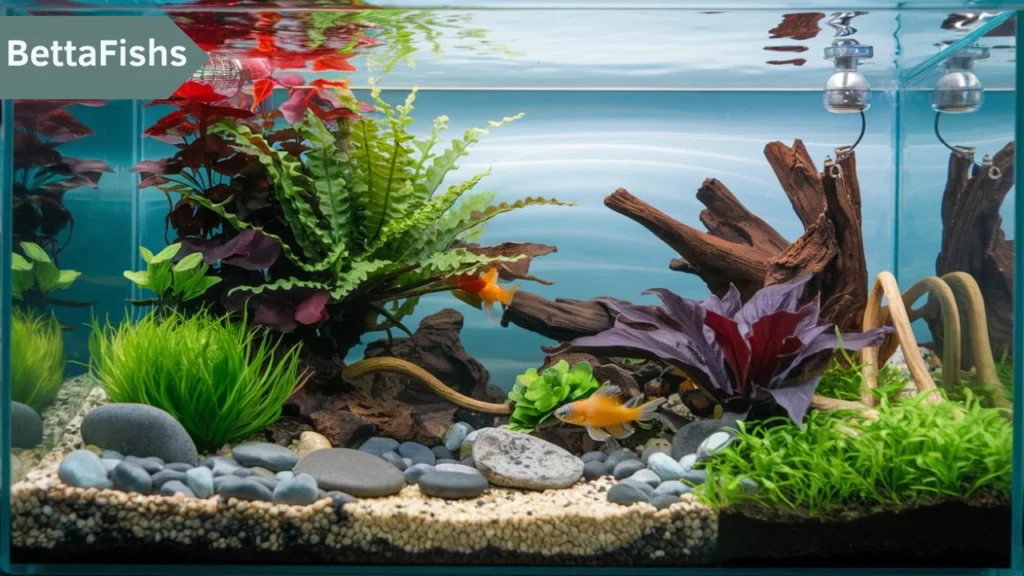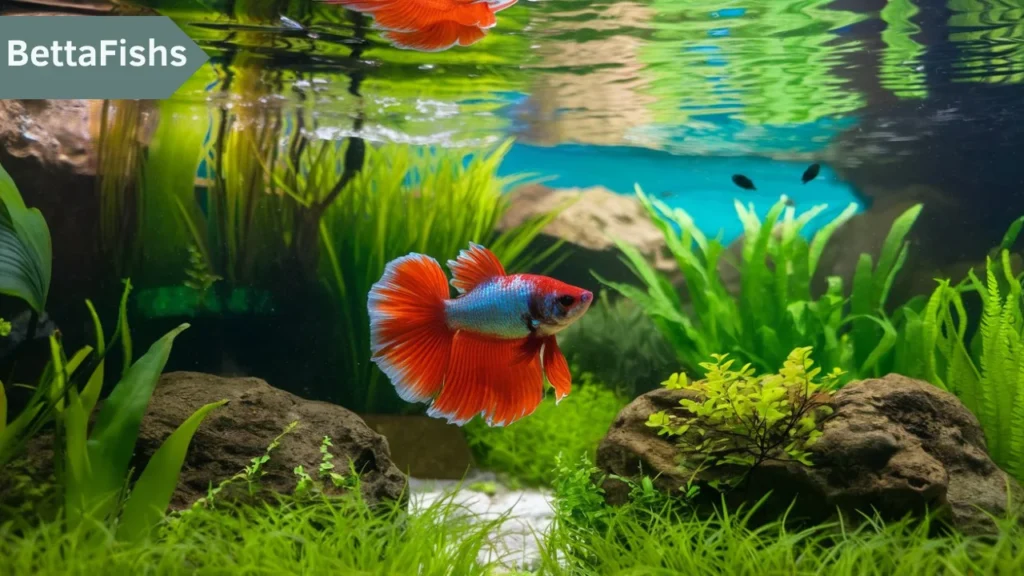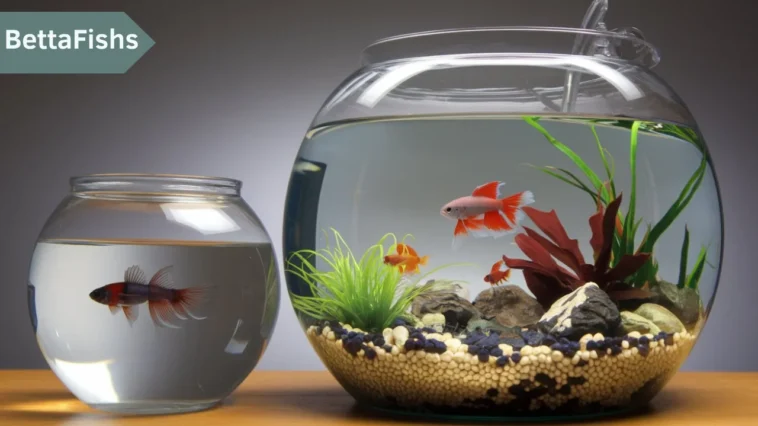Have you ever wandered into a pet store and seen Betta fish in those tiny cups, thinking, ” How much room do Betta fish need? ” It’s a common misconception that Betta fish require minimal room, but let’s clear that up right away Betta fish need more space than you might think! In this article, we’ll dive deep into the reasons why providing adequate space for your Betta fish is crucial for their health and well-being.
Betta Fish Behavior
To understand why space is important, let’s first take a look at the natural behavior of Betta fish. Originally from the shallow waters of Thailand, Betta fish are known for their vibrant colors and aggressive nature. In the wild, they thrive in rice paddies and slow-moving streams, which are actually quite expansive compared to the small containers they’re often kept in. Betta fish are territorial, and in their natural habitat, they have plenty of space to establish their own territory.
The Myth of Small Containers
So, where did the idea that Betta fish can live in small containers come from? This myth likely originated from their ability to survive in low-oxygen environments thanks to their labyrinth organ, which allows them to breathe atmospheric air. However, just because they can survive in such conditions doesn’t mean they thrive. Keeping a Betta in a small bowl or vase can lead to poor water quality, stress, and a decreased lifespan.
Ideal Tank Size for Betta Fish
When it comes to Betta fish care, size matters a lot. The recommended minimum tank size for a Betta fish is 5 gallons. This provides enough room for the fish to swim freely, reduces the buildup of toxins, and allows for a stable environment. While a 5-gallon tank is a minimum, many Betta enthusiasts suggest a larger tank, such as 10 gallons, to give your Betta more room to explore and exhibit natural behaviors.
The Role of Tank Shape and Design
The shape and design of the tank also play a significant role in the health of your Betta fish. Tall, narrow tanks might look stylish, but they aren’t ideal for Betta fish, which prefer horizontal swimming space. A long, shallow tank is much better suited to their needs, allowing for more natural movement and exploration.
Water Quality and Tank Size
A larger tank is easier to maintain and provides a more stable environment for your Betta fish. In smaller tanks, waste products such as ammonia and nitrites can quickly accumulate, leading to toxic conditions. A larger volume of water dilutes these toxins, making it easier to maintain a healthy environment. Additionally, a larger tank allows for better filtration and more stable water parameters, which are crucial for Betta fish health.

Betta Fish Compatibility and Tank Mates
One of the most frequently asked questions about Betta fish is whether they can share their space with other fish. While Betta fish are known for their aggressive behavior, they can coexist with certain species under the right conditions. However, it’s important to choose tank mates carefully and ensure the tank is large enough to accommodate multiple inhabitants without causing stress or competition.
The Impact of Space on Betta Fish Health
Providing adequate space for your Betta fish does more than just improve their physical health; it also has a significant impact on their mental well-being. Betta fish are curious and intelligent creatures that benefit from having room to explore, hide, and interact with their environment. A well-decorated tank with plenty of plants and hiding spots can provide mental stimulation and reduce stress.
Common Signs of Stress in Betta Fish
How do you know if your Betta fish is stressed or unhappy with its current living conditions? Look for signs such as clamped fins, lethargy, loss of appetite, and unusual swimming patterns. If your Betta seems to be hiding all the time or flaring its fins excessively, it could be a sign that it needs more space or a better environment.
Setting Up the Perfect Betta Tank
Setting up a Betta tank isn’t just about filling it with water and dropping in your fish. You’ll need to consider factors like filtration, water temperature, and decorations. Start with a good-quality tank of at least 5 gallons, add a gentle filter, and maintain a stable temperature between 76 and 82 degrees Fahrenheit. Include plants and hiding spots to mimic a natural environment, which will help your Betta feel more at home.
Frequently Asked Questions About Betta Fish Tanks
There are a lot of questions when it comes to Betta fish and their tanks. How frequently should a Betta tank be cleaned? What kind of water conditioner should you use? Can you keep a Betta in a bowl? These are all common queries, and the answers are crucial for maintaining a healthy, happy Betta fish.
The Long-Term Benefits of Proper Betta Care
Investing in a proper tank size and environment pays off in the long run. Betta fish that are well cared for in appropriately sized tanks tend to live longer, healthier lives. They show more vibrant colors, engage in more natural behaviors, and generally have a better quality of life.
Real-Life Stories: Betta Fish in Larger Tanks
Many Betta owners have seen firsthand the benefits of providing their fish with ample space. Stories abound of Betta fish that were moved from small bowls to larger tanks and showed immediate improvements in behavior and health. These firsthand accounts are a testament to the importance of proper Betta care.

Conclusion
In conclusion, Betta fish need more room than most people realize. A tank of at least 5 gallons, preferably larger, provides the space they need to thrive. Remember, a happy Betta is a healthy Betta, and giving them the room to swim, explore, and express natural behaviors is key to their well-being.
FAQs
What is the best tank size for a Betta fish?
The best tank size for a Betta fish is at least 5 gallons, but larger tanks, such as 10 gallons, are even better.
Can Betta fish live in bowls?
While Betta fish can survive in bowls, it is not ideal. Bowls often do not provide enough space or stable water conditions for Betta fish to thrive.
How often should you clean a Betta fish tank?
A Betta fish tank should be cleaned once a week if it is small, or every two weeks for larger tanks with proper filtration.
Are there any plants that Betta fish prefer?
Betta fish enjoy tanks with live plants like Java fern, Anubias, and Marimo moss balls, which provide hiding spots and help maintain water quality.
What other fish can live with a Betta?
Betta fish can live with certain species like Corydoras catfish, small snails, and shrimp, but tank mates should be chosen carefully to avoid aggression.




